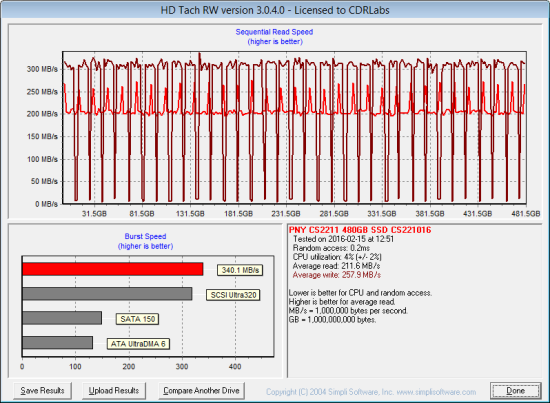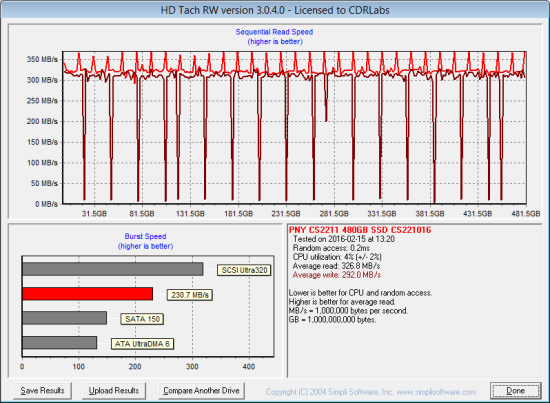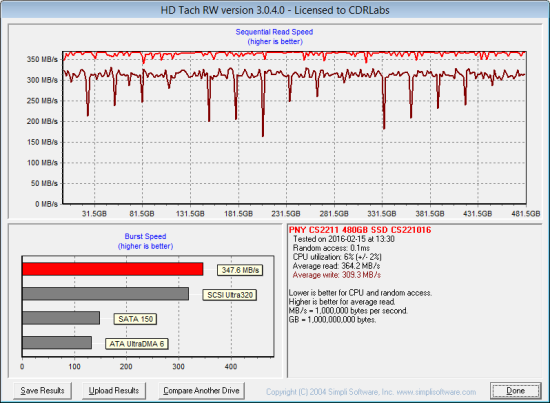TRIM Performance:
While SSD's offer many benefits, there are some downsides to using flash memory. One of the biggest issues people run into is performance degradation. Over time, an SSD will run out of fresh blocks and will have to write over data the file system has marked as deleted. This procedure is very complicated and can slow an SSD's write speeds considerably.
To fix this problem, most manufacturers have added TRIM support to their SSDs. The TRIM command allows an operating system, such as Windows 7, to tell an SSD which data blocks are no longer in use. Using this information, the drive pro-actively erases these blocks and adds them to the free block pool.

To test the CS2211's TRIM and garbage collection functions, I first put the drive in a "dirty" state. I used Iometer to fill the entire drive and then ran a random write test for 30 minutes. Looking at the screenshot below, you can see that the CS2211's average read and write speeds dropped to 211.6 MB/s and 257.9 MB/s, respectively.

PNY CS2211 - Dirty
To see how well the CS2211 could recover, I let the computer sit for about 45 minutes and then reran the test. The drive's average read speed climbed up to 326.8 MB/s. However, its read speed lagged behind, averaging out at 292.0 MB/s.

PNY CS2211 - After TRIM
Lastly, I used Parted Magic to perform a secure erase on the CS2211. With the drive wiped clean, it had average read and write speeds of 364.2 MB/s and 309.3 MB/s, respectively.

PNY CS2211 - Secure Erased
Final Thoughts:
The CS2211 is the first SSD from PNY to come through the 'Labs and to be honest, they could not have made a better first impression. Targeted at gamers and enthusiasts, PNY's next generation XLR8 series SSD combines Phison's quad-core, eight-channel Phison PS3110-S10 controller and Toshiba's 15nm MLC NAND flash to deliver some truly impressive performance. In our sequential read and write tests, the 480GB version of the CS2211 was able to read at speeds as high as 566 MB/s and write at speeds in excess of 544 MB/s. The drive also did very well in our random write tests, producing more than 86,000 IOPS at low queue depths.
Of course, impressive performance isn't the only thing the CS2211 has to offer. In addition to it having a four year warranty, the drive offers support for TRIM, background garbage collection, secure erase and various power management features. That being said, the CS2211 does not support Device Sleep (DEVSLP) or hardware based encryption. This probably isn't an issue if you're looking for an SSD for your workstation or gaming rig. However, these are things you may want to keep in mind if the CS2211 is going in a laptop or data security is a concern.
The CS2211 is available now in 240GB, 480GB and 960GB capacities. Prices on Amazon.com and PNY.com currently range from $70 up to $310, with the 480GB version reviewed here retailing for about $130.

Highs:
- Available in 240GB, 480GB and 960GB capacities
- Phison PS3110-S10 controller
- Excellent sequential read and write speeds
- Very good random read and write performance
- Performs equally well with compressible and incompressible data
- SATA 6Gb/s interface
- Good looking and well constructed design
- Includes 9.5mm adapter and Acronis data migration software
- Reasonably priced
- 4 year warranty
Lows:
- Does not support hardware based encryption
- Does not support DEVSLP

